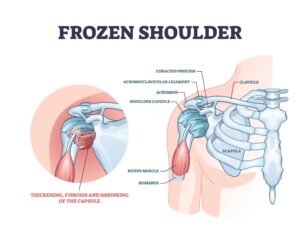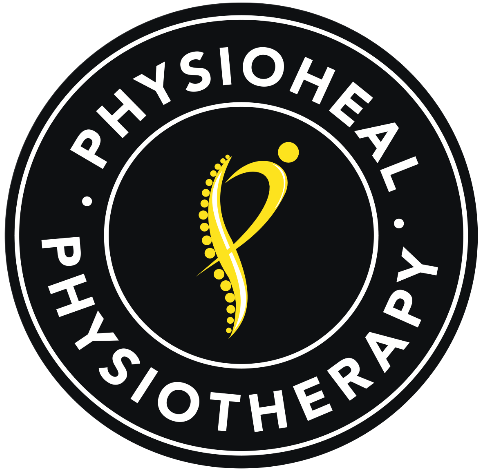We Are Open For Frozen Shoulder Treatment in Gurgaon!
Fill the form and let us call you back.
[gravityform id="3" title="false" description="false"]
Comprehensive Frozen Shoulder Treatment at Physioheal Physiotherapy, Gurgaon
Introduction to Frozen Shoulder (Adhesive Capsulitis)
Frozen Shoulder, also known as Adhesive capsulitis (AC), is a condition marked by progressively restricted shoulder joint movement accompanied by initial pain. At Physioheal Physiotherapy in Gurgaon, we offer specialized treatment for Frozen Shoulder, focusing on pain relief and improving range of motion.
Exploring Frozen Shoulder
- Common Names: Frozen Shoulder is also referred to as Adhesive Capsulitis, Painful Stiff Shoulder, or Periarthritis.
- Primary and Secondary Frozen Shoulder:
- Primary: Idiopathic onset, without an attributable reason.
- Secondary: Results from known causes, surgical events, or predisposing factors.

Prevalence and Demographics
- Prevalence: Occurs in 2-5% of the general population.
- Demographics: More common in females (70%), aged 35-65 years.
- Diabetes Association: High occurrence rate of 20% within the diabetic population.
Causes and Development of Frozen Shoulder
The exact cause of Frozen Shoulder remains unknown, but it typically affects middle-aged or older individuals. It results from irritation of the shoulder joint capsule, leading to ‘capsulitis’ and adhesion formation within the capsule.
Symptoms and Effects
A frozen shoulder causes pain and a loss of movement in the shoulder. The pain may be aching, dull or stabbing, and is usually felt deep in the shoulder and over the outside of the upper arm. The intensity of your pain may vary from day-to-day depending on how much you use your arm. The pain can often interfere with your normal daily activities and can also disturb your sleep. The loss of movement in the shoulder results from the scarring within the joint capsule. Additional symptoms of a frozen shoulder include:
- Weakness
- numbness
- spasm
- joint clicking may accompany Frozen Shoulder.
Assessment and Diagnosis
- Patient History: Listening to past medical history and pain distribution to rule out red flags and guide the examination.
- Observation of Posture: Identifying scapular winging and posture abnormalities.
- Range of Movement Assessment: Evaluating active, passive, and overpressure movements.
Physiotherapy Treatment Approaches
If the diagnosis of frozen shoulder is made, the physiotherapists at Physioheal Physiotherapy will be able to provide you with an appropriate treatment programme. This will most commonly be aimed at reducing your pain and improving your shoulder range of movement. It may involve the use of anti-inflammatory medications, electrotherapy treatment, and stretching, strengthening and range of movement exercises. Occasionally, if these measures do not provide relief, referral for an injection into the shoulder joint may be appropriate. Other physiotherapy options include:
- Postural Realignment
- Ergonomic Assessment
- Acupuncture
- Taping
- Soft Tissue Treatment
Importance of Early Treatment
Early intervention significantly reduces recovery time and prevents worsening of pain and restricted movement.
Positive Prognosis
With timely treatment, the long-term outlook for Frozen Shoulder is positive, unless there’s an underlying condition affecting the shoulder.
Consult the Leading Physiotherapist in Gurgaon
For effective Frozen Shoulder treatment in Gurgaon, consult Dr. Divya Gaur at Physioheal Physiotherapy. Our expert physiotherapists will design a personalized treatment plan to alleviate pain and restore shoulder mobility. Physioheal is one of the best physiotheapy clinic in Gurgaon having team of expert physiotherapists led by Dr Divya Gaur, the best physiotherapist in Gurgaon. Contact us at +91-9999259307, book online, or request a phone consultation. Let us help you regain your shoulder’s functionality.
